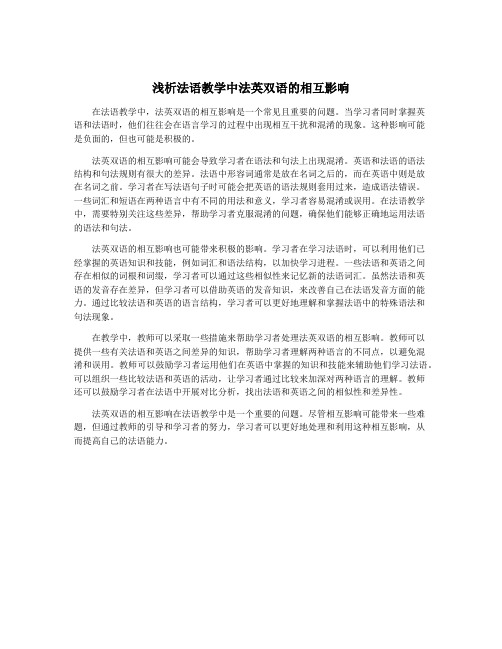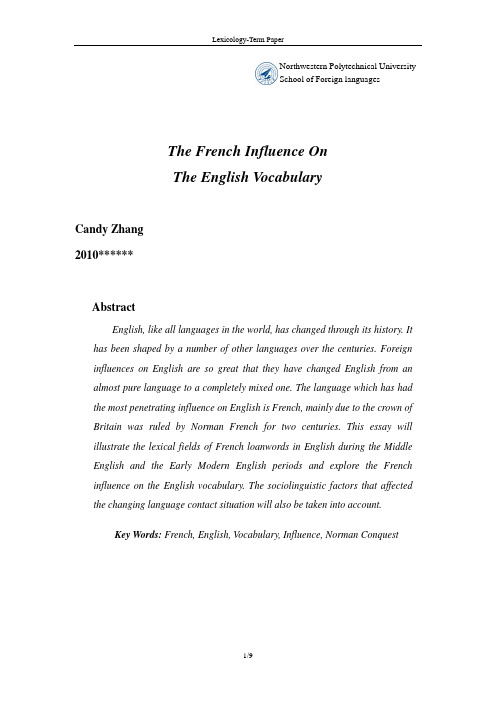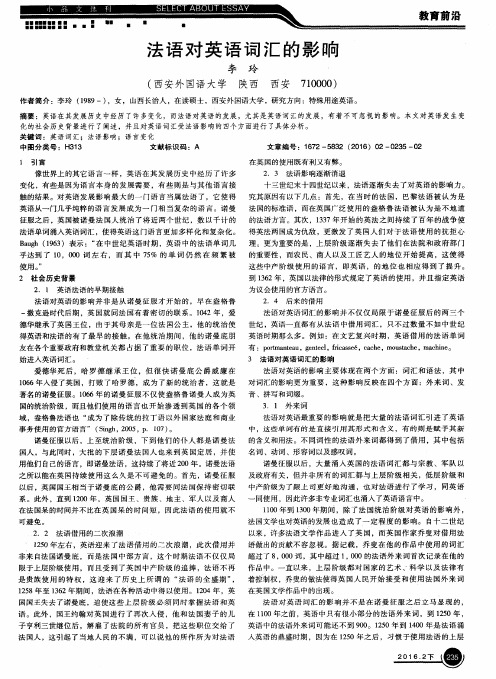法语对英语的影响03ban
浅析法语教学中法英双语的相互影响

浅析法语教学中法英双语的相互影响在法语教学中,法英双语的相互影响是一个常见且重要的问题。
当学习者同时掌握英语和法语时,他们往往会在语言学习的过程中出现相互干扰和混淆的现象。
这种影响可能是负面的,但也可能是积极的。
法英双语的相互影响可能会导致学习者在语法和句法上出现混淆。
英语和法语的语法结构和句法规则有很大的差异。
法语中形容词通常是放在名词之后的,而在英语中则是放在名词之前。
学习者在写法语句子时可能会把英语的语法规则套用过来,造成语法错误。
一些词汇和短语在两种语言中有不同的用法和意义,学习者容易混淆或误用。
在法语教学中,需要特别关注这些差异,帮助学习者克服混淆的问题,确保他们能够正确地运用法语的语法和句法。
法英双语的相互影响也可能带来积极的影响。
学习者在学习法语时,可以利用他们已经掌握的英语知识和技能,例如词汇和语法结构,以加快学习进程。
一些法语和英语之间存在相似的词根和词缀,学习者可以通过这些相似性来记忆新的法语词汇。
虽然法语和英语的发音存在差异,但学习者可以借助英语的发音知识,来改善自己在法语发音方面的能力。
通过比较法语和英语的语言结构,学习者可以更好地理解和掌握法语中的特殊语法和句法现象。
在教学中,教师可以采取一些措施来帮助学习者处理法英双语的相互影响。
教师可以提供一些有关法语和英语之间差异的知识,帮助学习者理解两种语言的不同点,以避免混淆和误用。
教师可以鼓励学习者运用他们在英语中掌握的知识和技能来辅助他们学习法语。
可以组织一些比较法语和英语的活动,让学习者通过比较来加深对两种语言的理解。
教师还可以鼓励学习者在法语中开展对比分析,找出法语和英语之间的相似性和差异性。
法英双语的相互影响在法语教学中是一个重要的问题。
尽管相互影响可能带来一些难题,但通过教师的引导和学习者的努力,学习者可以更好地处理和利用这种相互影响,从而提高自己的法语能力。
浅析法语教学中法英双语的相互影响

浅析法语教学中法英双语的相互影响
在法语教学中,法英双语的相互影响是不可避免的。
由于英语作为全球通用语言,许多法语学习者首先学会的是英语,因此英语的词汇、语法和发音会对学习法语产生影响。
同时,法语和英语又存在许多相似之处,这也会促进学习者的学习和理解。
词汇方面,英语和法语同源的单词有很多,例如“restaurant”和“bicycle”。
这些词汇的相似性使得学习者更容易学会这些单词,并加深对它们的记忆。
然而,有些词汇的相似性也会产生误解。
例如,“excité”在法语中的意思是“兴奋”,而在英语中则是贬义词“兴奋过度”,这容易导致学习者产生误解。
语法方面,英语和法语的语序不同,这也影响到学习者在翻译和表达时的理解和准确度。
例如,法语中形容词通常位于名词之前,而英语中则位于名词之后。
这就需要学习者产生形式上的转化,将习惯于英语语序的思维模式转变为适应法语语序的模式。
发音方面,英语和法语的发音差异很明显。
学习者需要学会正确地发音法语的元音和辅音,往往需要先去学习英语以外的语言。
另外,英语的图音对照也会对学习者的发音产生影响,例如英语的“th”音在法语中并没有对应的音,这就需要学习者做出形式上的调整。
总之,在法语教学中,法英双语的相互影响是一把双刃剑。
学习者需要在相似性的基础上,认真分析差异性,从而避免犯错和受到干扰。
教师应该针对学习者的习惯和特点,制定适当的教学方法和策略,使学习更加高效和有效。
The French Influence On English Vocabulary 法语对英语词汇的影响

Northwestern Polytechnical UniversitySchool of Foreign languagesThe French Influence OnThe English VocabularyCandy Zhang2010******AbstractEnglish, like all languages in the world, has changed through its history. It has been shaped by a number of other languages over the centuries. Foreign influences on English are so great that they have changed English from an almost pure language to a completely mixed one. The language which has had the most penetrating influence on English is French, mainly due to the crown of Britain was ruled by Norman French for two centuries. This essay will illustrate the lexical fields of French loanwords in English during the Middle English and the Early Modern English periods and explore the French influence on the English vocabulary. The sociolinguistic factors that affected the changing language contact situation will also be taken into account.Key Words:French, English, Vocabulary, Influence, Norman ConquestIntroductionThe development of a certain language has a long history. It is inevitable that different languages influence and penetrate each other in their formation and development. English is a typical representative of this kind of language that assimilates the refined parts of other languages to enrich itself. Today, the English language is the third most widely spoken language in the world after Mandarin and Spanish. It is the official language of most of the Commonwealth countries and is widely learned as a second language in most of the countries of the world. Historically, English has been greatly influenced by various languages, especially by French. The influence of the French language upon the English language can be divided into two main stages. The first stage is from Norman Conquest to the year 1500 (the Middle English period). During this period over 10,000 French words were adopted into English and about 75 percent of these are still in use. At this stage the French was used by the upper class at first, and then the two languages mixed up and the French was acknowledged by common people. The second stage is from the Renaissance to the twentieth century (the Early Modern English period). During this period the scale of loanwords was wider and we can find words relating to every aspect of human society. Moreover, the degree of vocabulary influence was considerable.The Influence of French on the English vocabulary during the Middle English PeriodSocial-historical backgroundOne of the most significant influences on Middle English was French, strictly, Norman French, the language introduced in Britain by the invader. Since Edward, king of England, died childless, Harold was elected the king. But his power was challenged by William, Duke of Normandy. He invaded the country and won Harold, and then on Christmas 1066, he was crowned as the king of England.After the conquest, the ruling classes, their servants and the bishops were Normans. Moreover, a large number of Norman French lower classes came to England. Since the actual number of the Normans who settled in England wassufficiently great, they continued to use their own language, Norman French. The main reason for the continuity can be sought in the fact that the kings of England were likewise dukes of Normandy. Therefore, it was natural for the kings to keep contact with their territories in France. For about 200 years after the Conquest the two languages Anglo-Saxon and Norman-French were used side by side without mingling. However, since the two peoples of the society could not live separately, and had some relations with each other, they gradually came to learn and understand the other language. The Englishman who associated with the governing class soon mastered French. Knowing French and speaking it was a mark of social status at that time. Meanwhile, as English was the language of greater part of the population, many of the Frenchmen would get familiar with it.However, in 1204, the English kings lost Normandy. The loss of Normandy was advantageous to the English language because the upper classes became bilingual. They intended to use their own language. The decay of French as the predominant language of the ruling classes was hastened by another invasion. The new invasion began in the time of King John, whose wife was from France. In the time of his son, Henry Ⅲ, great number of Frenchmen poured into England. He dismissed all the native officers and appointed foreigners in their places. Consequently, national feelings aroused the Englishmen. Another factor was the hundred years’war, beginning in 1337, which made England and France bitter enemies. It further aroused the national feelings against the use of French. At the same time, the condition of the peasant class gradually improved, and the merchant and craftsman class developed increasingly important in the towns, becoming a rich and powerful class between the nobility and peasants. Such an increase in the importance of the peasants and this new middle class undoubtedly led to an increase in the importance of the language they spoke. Thus, at the end of the thirteenth century and especially in the course of the fourteenth century, French language gradually lost its influence on English.The Norman French influence on the English vocabularyThe Norman’s influence was so great that the English language after the Norman Conquest was very different from the language of the Anglo-Saxons. The mostimportant influence the French language had on the English language was the introduction of too many French words into English. In the influx of French words two stages can be known, with the year 1250 as an approximate dividing line. Since the French influence on the English language did not occur immediately after the Conquest, there were probably not more than 900 loan words before 1250. After 1250, the upper classes who had been accustomed to speak French were returning to use English. As they did not know English perfectly, they often needed to use French to express themselves. The language with more powerful speakers was regarded as more prestigious. In this way the upper classes brought an astonishing number of French words relating to government, administration, law, religion, army, and art into English. These lexical items reflected the interests of the French-speaking ruling group, and had prestigious connotations. However, it should be noted that not all French loan words are related to these classes. The lower and specially the middle class of Englishman liked to be able to communicate with their superiors and also thought it fine to be able to talk French. In this way many common French words relating to fashion, food, social life, learning and medicine found their ways into the English vocabulary. (A list of some French loan words is provided in Appendix Ⅰ) During this long period of time, French literary influence was not restricted to the Continent. From the beginning of the twelfth century much literature written in French was produced in England. When books began to be written once more in English, most of the terms at hand to express ideas were found in the language of the upper classes people who for the past two centuries had the chief control of art, science and law. Hence, a large number of French words were adopted to replace the forgotten English ones.Moreover, it is necessary to mention that although the introduction of the French words into English resulted in the extinction of too many Anglo-Saxon words, many of the English words continues to be used side by side with their French equivalents. But, with time went by, some differences developed between the synonyms. The native words are more popular and fundamental, while the French words are often more formal, more polite and less emotional. (A list of some of the synonyms isprovided in Appendix Ⅱ)It should also be mentioned that one of the characteristics of Old English was to enlarge its vocabulary chiefly by using prefixes and suffixes. With the borrowing of a large number of French words, French affixes found their ways in English. Furthermore, the English affixes were also added to French loan words. Some of the French affixes which entered English are as follows.Prefixes: con-, de-, dis-, ex-, pre-, en-, pro-, trans-.Suffixes: -ee, -ance, -ant, -ation, -ment, -ism, -ity, -able, -al, -ous, -fy, -ize.The Influence of French on the English Vocabulary during the Early Modern English PeriodFrench influence on the English vocabulary is not only restricted to the two or three centuries after the Norman Conquest. English has always borrowed from French.Around the year 1500, the intellectual awakening of Europe (the Renaissance) reached England. The words such as portmanteau, genteel, cache, moustache and machine are examples of the words borrowed at this time.In the middle of the seventeenth century, there was a civil war in England, and the court resided in France. Therefore, with the Restoration, a large number of French words came into English. Examples are parole, rendezvous, envelope, critique, memoir, tableau, routine and so on.The French revolution which occurred in the end of the eighteenth century also resulted in the borrowing of many French words relating to revolution into England. For example, regime, guillotine, aristocrat, democrat, revolutionize, royalism, terrorism, liberal, conservative, despotism, and many others.In the nineteenth century, there were increased travel facilities which led to more and more people going to France both for business and pleasure. In this way numerous words related to art, food and drink, fashion, adornment of home and social pastimes entered the English language. Examples are ballet, souvenir, cuisine, moquette, liqueur, route, canteen, bureau, baroque, rococo, blouse, acrobat,restaurant, chef, prestige, etc.More than a century ago, French was still widely considered a prestigious language. It was the diplomatic language of the world and it had considerable popularity in literary and scientific circles. During the late nineteenth century its prestige gradually declined. Examples of this period are garage, limousine, camouflage, revue and so on.Although the status of French has fluctuated throughout the history of English, the heavy borrowing and influence on twentieth century terms relating to journalism and the media indicates French influence persists. French as a borrowing continues its contribution to the English vocabulary.ConclusionBy analyzing the fusion of the two languages, this paper has presented how French loan words take effects in the Middle English period and the Early Modern English period. From the aspects mentioned above, it is clear that the influence of the French language upon the English vocabulary is great, deep and permanent. Thousands of French words entered English. Some words are assimilated; some native words are lost wh ile other words’ meanings are expanded. What makes a nation borrow words from another language has been clearly stated by Dr. J.A. Sheared (1962), “The acquisition of loan words from another language shows that the borrower feels that there is something superior in the foreign language, or in the people who use it, for we may suppose that no reasonable being would deliberately make use of foreign words if he felt that his own language possessed words which did the job better.” Finally, it is worthy to mention that English has become a rich language containing very large vocabulary thanks to the contact with and the assimilation of words from other languages.The List of Some of the French Loan WordsReligion:ceremony, baptism, Bible, prayer, lesson, sermon, relic, miracle, disciple, abbot, clergy, sacrament, etc.Law: attorney, felony, larceny, judge, jury, justice, estate, sue, fee, plea, defendant, prison, suit, advocate, complaint, summon, court, accuse, bill, act, tax, lease, assets, embezzle, disclaim, etc.Government: people, parliament, crown, reign, treaty, council, cabinet, city, minister, nation, village, domicile, etc.Military:army, navy, enemy, battle, defense, retreat, soldier, guard, spy, sergeant, manor, chattel, captain, corporeal, etc.Titles and offices: duke, marquis, baron, constable, count, lieutenant, mayor, prince, viscount, vicar, dean, chancellor, countess, etc.Art and Science: art, painting, sculpture, music, beauty, figure, image, tone, literature, poet, romance, story, chronicle, tragedy, prologue, preface, title, volume, chapter, paper, treatise, study, logic, geometry, grammar, noun, clause, gender, medicine, physician, surgeon, malady, pain, plague, anatomy, stomach, pulse, remedy, ointment, poison, alkali, sulphur, etc.Architecture:cathedral, palace, mansion, chamber, ceiling, cellar, chimney, lattice, tower, porch, column, pillar, base, brick, storey, attic, tile, lintel, etc.Abstract terms: sense, honour, glory, fame, colour, dignity, chivalry, piety, science, nature, etc.Social life and domestic economy:curtain, couch, chain, cushion, screen, lamp, lantern, blanket, towel, basin, parlor, wardrobe, closet, chess, recreation, leisure, fool, minstrel, etc.Fashion: fashion, dress, habit, gown, robe, garment, cape, cloak, coat, frock, collar, veil, train, chemise, trousers, lace, embroidery, buckle, button, plume, kerchief, boots, galoshes, etc.Natural Scenery: valley, mountain, river, torrent, fountain, gravel, etc.Colour: blue, brown, vermilion, scarlet, violet, crimson, mauve, etc.Jewelry:Jewel, ivory, enamel, brooch, turquoise, amethyst, topaz, garnet, ruby, emerald, pearl, diamond, crystal, coral, beryl, etc.Relationship: aunt, cousin, spouse, parent, uncle, nephew, niece, etc.Division of time: hour, minute, second.The List of Some of the SynonymsBibliographyTaraneh. A. Tabari, Lecturer of Tarbeyat Moallem University, The French Influence on the English LanguageIsabel Roth, ISSN: 2041-6776, INNERV ATE Leading Undergraduate Work in English Studies, V olume 3 (2010-2011), pp. 255-262, Explore the Influence of French on EnglishSusana Lopez Polo, FRENCH INFLUENCE ON MIDDLE ENGLISHDana Melzer, Universitat Leipzig, The French Influence on the English Language in the Middle English PeriodSheard, J.A., The Words We Use。
浅析法语教学中法英双语的相互影响

浅析法语教学中法英双语的相互影响法语教学中,法英双语的相互影响具有重要意义。
法英双语的相互影响可以帮助学生更好地理解和掌握法语语法和词汇,提高他们的语言运用能力。
本文将从语法、词汇和交际能力三个方面,对法语教学中法英双语的相互影响进行浅析。
在语法方面,法英双语的相互影响帮助学生理解和运用法语语法规则。
因为法语和英语在语法结构上存在一定的相似性,学生可以通过对比英语和法语的语法规则,更好地理解和记忆法语的语法知识。
法语的定冠词le和英语的the在用法上有很大的相似性,学生可以通过比较两种语言的用法,从而掌握法语中定冠词的使用方法。
法英双语的相互影响也可以帮助学生扩大词汇量。
因为法语和英语都源自于拉丁语系,所以在词汇方面存在很多相似之处。
学生可以通过对比学习英语和法语的词汇,掌握相同或相近的词汇,并抓住它们之间的差异,以便更好地运用法语词汇。
法语中的"restaurant"和英语中的"restaurant"在意义上是相同的,学生可以通过学习英语中的这个词,更好地理解和掌握法语中的这个词。
法英双语的相互影响对于学生的交际能力提高也起到了积极的作用。
因为法语和英语都是国际通用语言,学生可以通过对比学习法语和英语的交际用语,提高自己的跨文化交际能力。
在英语中我们常用的问候语"hello"在法语中对应的是"bonjour",学生可以通过对比学习这两种语言的问候语,了解它们的用法差异,使自己在实际交际中更具效果。
虽然法英双语的相互影响在法语教学中起到了积极的作用,但也存在一些需要注意的问题。
学生应该清楚识别法语和英语之间的区别,避免混淆。
在法语中,动词的时态和语气的变化较多,而英语相对简单,学生容易将两种语言的时态和语气规则混淆。
学生需要根据不同的语境进行灵活运用,避免机械翻译。
当学生在使用法语时仅依赖英语的思维模式和语法结构时,容易出现语言表达不准确,甚至难以理解的问题。
英语中的法语

摘 要: 英语在发展过程中广泛地向世界上许多语言直接或间接地借用了大量外来词,其中来自 法语的词语约占 英语 词汇的2614%。本文追溯 法语对 英语产生重大影响的几个重要历史时期,分析 英语中大量的 法语借词产生的历史原因及其对英国文化的影响。 英语属印欧语系日耳曼语族, 法语属印欧语系罗曼语族,两者分属不同的语族,但 英语吸收了大量的 法语 词汇。根据斯基特的《词源词典》统计, 英语中直接或间接来自 法语的 词汇占 英语 词汇的2614%。 [1]由此可见 法语对 英语的影响之深远,法英两种语言的关系之密切。从8世纪后半叶到10世纪,北欧日德兰半岛和斯堪的纳维亚半岛等地的诺曼人向欧洲大陆各国进行掠夺性和商业性的远征,在各地定居的诺曼人旋即与当地居民同化,其中在法国西北部的诺曼底建立公国的诺曼人接受了 法语、基督教和当时法国的政治制度。诺曼人征服英国前,英国和诺曼底的统治阶级就已经开始了社会、政治和宗教领域的交往。撒克逊国王埃塞雷德娶了诺曼底的一位公主,其子爱德华后来登上了英国王位。在这些王朝统治期间,诺曼底贵族及其侍从在英国享有重要地位,也促使一些 法语 词汇进入了 英语。 [2]如:castle就是诺曼底贵族居住的像防御工事一样的新型建筑,取代了古 英语的burg。capun(capon)和bacon则让人想到法式烹饪的繁冗奢华。在 英语发展的历史中,第一次引进 法语的高潮出现在中古 英语时期,这是在诺曼人征服英国后三百多年的时间内发生的。公元1066年,诺曼底的威廉公爵统帅大军进攻英国,英国国王哈罗德的王朝被推翻,法国的公爵成了英国的国王,从而开始了法国诺曼底人对英国的长期统治, 法语是当时的官方语言。从1066年开始直到1399年亨利四世继位称王之前,三百多年里英国的国王都说 法语。[1]封建领主、贵族官吏以及其他上层人士都以讲 法语为荣。宫廷、法院、学校均使用 法语,文学作品也用 法语创作。统治英国的诺曼底人认为 英语“粗陋”,不能登大雅之堂,只适于贫困的农民、牧民和偏僻山乡的村民使用。由于 法语在当时社会的主导地位,这个时期的 英语很自然地吸收了大量的 法语 词汇。中古 英语对 法语 词汇成分的吸收,可分为两个阶段:在第一阶段中(即从1066年至1250年期间),由于 法语是在上层社会通用,下层劳动人民仍使用 英语,所以渗入 英语的 法语多是那些居于社会底层的人在使用,在与讲 法语的贵族接触时必须熟知的 词汇有[3]:noble,dame,servant,messenger,feast,min2strel,juggler,largess等。居统治地位的贵族的爵位名称绝大部分被 法语所取代,公、侯、伯、子、男及其夫人的名称依次为:duke,duchess;marquis(=mar2quess),marchinos;earl,countess;viscount,viscount2ess;baron,baroness。在这些词中,惟有earl原是 英语,其余全部来自 法语。1150年,史迪夫国王统治时期,Peterborough的一名修道士任朝廷史记官。尽管他是英国人,但是叙记中却夹带许多 法语 词汇,如:acorn(come to agreement),bataille,curt(court),cuntess(countess),rent,tresor,carited(charity),pais(peace),miracle,processiun等。这一阶段进入 英语的 法语单词只有900至1000个。诺曼底王朝统治英国近100年,其势力范围不断扩张,不仅继续统治诺曼底,而且二分之一多的法国国土也曾一度为英王统治,国王在伦敦的宫廷则成了法国文明的中心。在中古 英语时期,英国的国王多是诺曼底的公爵,他们与法国有着千丝万缕的联系。除亨利一世外,直到15世纪中期,没有一个国王与英国的女性结为配偶。许多英国上层人士以与法国人联姻为荣。可见,诺曼人在英国的统治地位和英国人对法国文化的痴迷促使 法语在中古 英语时期长期成为英国的官方语言。1204年,约翰王在对法战争中大败,失去领地诺曼底,英国和诺曼底之间的直接联系削弱了,诺曼人开始把英国当成他们永久的家园,也逐渐与英国人融合在一起。 法语被视为官方语言的理论基础和心理基础也随之不存在了。14世纪时 英语已被大部分文学作品和上流社会所接受。1258年国王的敕令第一次同时以英、法两种语言发布。到1337年,当爱德华三世召开国会(Parliament一词也源自 法语)研究讨伐法国的事情时,国王的发言人一直用 英语发言,与会者均能听懂。[3]但是在几百年的时间内,法庭上依然提倡使用 法语。许多法律 词汇一直沿用至今。如:lese majeste,plaintiff,defendant,privilege,distraint,tort,malfeasance等。从这些 词汇可以想见 法语在英国的法律事务中曾经占据的主导地位。中古时期 英语吸收 法语 词汇的第二阶段大致在1250年至1500年期间。如上所述,约翰王痛失诺曼底后, 法语作为官方语言的基础不复存在。统治英国的法国贵族后裔被迫学习 英语,转用 英语进行交际。他们一旦遇到语言表达的困难,或者出于需要,或者由于风尚,便借用 法语 词汇,这便使得许多 法语 词汇进入 英语。仅在1250年到1400年的150年内,就有约10 000个 法语单词进入 英语 词汇,其中的75%一直沿用至今。[3]以乔叟著作为例,他在自己的诗著里共用了约8000个单词,而其中约有4000个以上的词是罗曼语族语言( 法语属罗曼语族)。以下引自乔叟的著名长诗《坎特伯雷故事集》的序言,其中斜体部分的词语均源自 法语:[2]What that April with this shoures soteThe droghte of March hath perced to the rote,And bathed every veine in swich licourOf which vertu engendred is the flour,Whan Zephirus eek with his swete brethInspired hath in every holt and hethThe tendre croppes,and the yonge sonneHath in the Ram his halve cours yronne,And smale foules maken melodyeThat slepen al the nyght with open ye,(So piketh hem Nature in hir corages,)Than longen folk to goon on pilgrimsges———And palmers for to seken strange strondesTo ferne halwes couth in sondry londes:And specially from every shires endeOf Engelond to Canterbury they wende,The holy blisful Martyr for to sekeThat hem hath holpen whan that they were seke.以上18行诗句中,除专有名词和martyr(可能直接源于拉丁语)外,至少有18个词源于 法语。在一些涉及狩猎、烹调、比赛等专业性较强的篇章中,源自 法语的 词汇所占的比例则更大。这一时期的 法语借用词多数是简短词,涉及政治、法律、军事、宗教、文化和医学及日常生活等各个领域。诺曼人征服英国后,成了英国的统治者,他们不仅以法国的政治体制、法律法规来统治英国人民,也将他们那套奢华繁冗、附庸风雅的生活方式带入了英国。英文中许多与服饰、时尚、食品、文学艺术相关的词语均来自 法语。如:dress,cloak,collar,but2ton,boots,diamond,salad,sugar,orange,lemon,bis2cuit,cream,art,painting,learning,beauty,color,image,tone,tragedy,preface等。最为有趣的是 英语中最常见的几种食用肉都是用 法语 词汇来表示的,如:beef(牛肉),veal(小牛肉),mutton(羊肉),pork(猪肉)。活着饲养的牛(ox)、羊(sheep)、猪(pig)使用 英语 词汇,但宰杀烹调后被送到法国主子的 餐桌上便使用 法语 词汇了。确实,从现今英国人生活的许多方面都可以管窥法国文化的影响。英文中的许多菜名都是 法语 词汇,英国至今有不少饭店的整个菜单都是用 法语写的。再如,现在英国有一种名酒的品牌称为“beefeater”(食牛肉者),就是以当年威廉一世的王宫侍卫为象征。酒瓶上身穿当时英国宫廷红色军装的侍卫,便是到英国吃牛肉的“代表人物”。以此为品牌,目的是要说明此酒品质高贵和公司历史悠久。诺曼人统治英国初期,英国当时懂 法语的人少。为了便于两国人了解和沟通,除了翻译以外,便是同时使用 英语和 法语的同义词语。 法语 词汇的渗入极大地丰富了 英语的同义词,并增强了语言的表现力,许多词一直沿用至今。例如(按先 英语后 法语的次序排列):begin—commence;brave—valiant;buy—pur2chase;clothes—garment;dealer—merchant;get—obtain;go on—proceed;harm—injure;hide—conceal;make—manufacture;manmade—artificial;often—frequently;ask—inquire;fire—flame;share—portion;weak—frail;ship—vessel;stop—cease;true—veritable;rise—mount…当然,这些同义词也存在一定的差异,但主要是使用场合及语体色彩的不同。这么多的同义词共存至今是诺曼底征服时期英国文明和法国文明并存、 英语和 法语并用的重要历史见证。此外,源自英、法两种语言的许多 词汇由于指的是同一事物或概念,经常被放在一起使用,如:law and order(法律和规定),lord and master(老爷),act and deed(行为),safeand sound(安然无恙),ways and means(方法),ac2knowledge and confess(承认)等。law and order在 英语里早已成为习惯搭配“,法律和秩序”应当作一件事物,谓语动词用第三人称单数。在中古 英语后期, 法语对 英语的影响一直持续到“百年战争”(1346~1453)。但是,在对待 法语借用词的方法上却与中古 英语早期有明显不同。具体表现在两个方面:首先,中古 英语早期的特点是广泛吸纳 法语
法语对英语词汇的影响

诺 曼征 服 以后 ,上 至统 治 阶 级 ,下 到 他 们 的仆 人 都 是 诺 曼 法 的含 义和用 法 。不 同词 性 的 法语 外 来 词 都 得 到 了借 用 ,其 中包 括 国人 ,与此 同时 ,大 批 的下层 诺 曼 法 国人 也来 到 英 国定 居 ,并 使 名词 、动词 、形 容词 以及感 叹词 。 用 他们 自己的语 言 ,即诺曼 法语 ,这持 续 了将近 2 0 0年 。诺 曼法 语 以后 ,英 国国王相 当于 诺 曼 底 的公 爵 ,他 需 要 同 法 国保 持 密 切 联 系。此 外 ,直到 1 2 0 0年 ,英 国 国王 、贵 族 、地 主 、军 人 以及 商 人
2 社会 历史 背景
2 . 1 英语 法语 的早 期接 触
到1 3 6 2年 ,英 国以法 律的形 式 规定 了英语 的使 用 ,并且 指 定英 语
为议 会使 用 的官方语 言 。 2 .4 后来 的借 用
法 语对英 语 的影 响 并非 是 从 诺 曼 征服 才 开 始 的 ,早 在 盎格 鲁
关键 词 :英 语词 汇 ;法语 影响 ;语 言变化 中图分 类号 :H 3 1 3
1 引言
文献 标识码 :A
文章 编号 :1 6 7 2— 5 8 3 2( 2 0 1 6 )0 2— 0 2 3 5— 0 2 在英 国的使用 既有 利又 有弊 。 2 .3 法语 影 响逐渐 消退
始进 入英 语词 汇 。
3 法语对 英语 词汇 的影 响
爱德华 死 后 ,哈 罗 德 继 承 王 位 ,但 很 快 诺 曼 底 公 爵威 廉 在
法 语对 英语 的 影 响 主要 体 现 在两 个 方 面 :词 汇 和 语 法 ,其 中
1 0 6 6 年 入侵 了英 国 ,打败 了哈 罗 德 ,成 为 了新 的统 治者 ,这就 是 对词 汇 的影 响更 为重 要 ,这 种 影 响反 映在 四个 方 面 :外 来 词 、发
浅析法语教学中法英双语的相互影响

浅析法语教学中法英双语的相互影响在法语教学中,使用法英双语是一种常见的教学方法。
这种教学方法的目的是帮助学生更好地理解和运用法语,同时也有利于促进学生对英语的学习和理解。
以下是对法英双语在法语教学中的相互影响进行浅析。
在法语教学中使用法英双语能够帮助学生更快地理解和记忆新的法语单词和句子。
通过将法语与英语进行对比和联系,学生可以更好地理解法语的含义和用法。
当学生学习一个新的法语单词时,教师可以用英语解释该单词的意思,这样学生就能够更快地理解并记住这个单词。
通过使用法英双语,学生可以比较法语和英语之间的语法和词汇差异,进一步提高对法语的理解和运用能力。
在法语教学中使用法英双语能够帮助学生培养语言切换的能力。
在现实生活中,人们常常需要使用多种语言进行交流,因此培养学生的语言切换能力具有重要意义。
通过使用法英双语进行法语教学,可以帮助学生熟悉和掌握语言切换的技巧和方法。
学生在使用法英双语进行交流和学习时,需要根据具体情境和目的选择使用哪种语言,这样有助于培养学生对语言的敏感度和自主选择的能力。
使用法英双语还能够帮助学生更好地理解法语和英语之间的文化差异。
语言不仅仅是一种工具,还承载着丰富的文化内涵。
通过使用法英双语进行教学,教师可以通过对法语和英语背后的文化差异进行比较和解释,帮助学生更全面地了解和理解法语和英语所代表的不同文化。
这对学生来说是一种宝贵的学习机会,有助于增强他们的跨文化交际能力和文化意识。
使用法英双语也存在一些潜在的问题和挑战。
过多地依赖法英双语可能会造成学生对法语单词和句子的直接翻译,而无法真正理解和掌握法语的表达方式。
在使用法英双语进行教学时,教师需要适度控制使用双语的程度,避免过度依赖和滥用这种教学方法。
使用法英双语可能会对学生的听力和口语技能产生一定的负面影响。
学生在使用法英双语进行学习和交流时,可能会降低对法语的听力和口语训练的需求和重视程度。
教师需要通过其他适当的教学手段和活动来弥补这方面的不足,例如听力训练、口语演练等。
浅析法语教学中法英双语的相互影响

浅析法语教学中法英双语的相互影响法语教学中的法英双语对学生的影响是一个备受关注的话题。
随着全球化的发展,英语已经成为了世界上最重要的语言之一,而法语作为另一种重要的国际语言,其教学也越来越受到关注。
在法语教学中,学生常常会接触到法语和英语这两种语言,双语的教学方法也得到了广泛的应用。
这种双语教学模式究竟会对学生产生怎样的影响呢?本文将从法英双语的相互影响这一角度来进行分析和探讨。
法英双语教学对学生的语言能力有一定的影响。
学生在学习法语的过程中,接触到的英语知识可能会对他们的法语学习产生影响。
一方面,学生可能会通过对比英语和法语的语法、词汇等,来更好地理解法语的语言规则,从而提高语言的学习效果。
如果学生对英语的掌握更加深入,可能会出现将英语的语法、词汇等知识误加到法语中的情况,从而损害了他们的法语学习。
在双语教学中,教师需要引导学生正确对待两种语言,避免出现语言干扰的情况。
法英双语教学对学生的语言思维方式产生了一定的影响。
在法英双语的环境中,学生可能会形成一种以英语为基础的思维方式,这种方式会影响到他们在学习法语时的思维习惯。
在表达某种意思时,他们可能会首先想到英语中的表达方式,然后再转换成法语进行表达,这样可能会造成一定的语言障碍。
在双语教学中,教师需要引导学生逐渐培养法语思维的习惯,帮助他们更好地融入法语的语言环境。
在实际的教学中,可以采取一些有效的方法来引导学生更好地应对法英双语环境带来的影响。
可以通过对比法语和英语的语法、词汇等来帮助学生更好地理解法语语言规则。
可以通过大量的语言实践来帮助学生培养法语思维的习惯,例如口语交流、阅读理解、写作等。
可以通过激发学生对法语本身的兴趣,来引导他们主动地去学习和探索法语语言,从而更好地应对法英双语的影响。
- 1、下载文档前请自行甄别文档内容的完整性,平台不提供额外的编辑、内容补充、找答案等附加服务。
- 2、"仅部分预览"的文档,不可在线预览部分如存在完整性等问题,可反馈申请退款(可完整预览的文档不适用该条件!)。
- 3、如文档侵犯您的权益,请联系客服反馈,我们会尽快为您处理(人工客服工作时间:9:00-18:30)。
法语对英语词汇的影响内容摘要:关键词:一、引言语言是人类交流的工具,不同民族的人们之间的交往和不同文化的交流必然要通过语言的媒介来实现。
因此,语言之间的互相融通借代是人类各种语言发展的必然规律。
英语之所以能成为当今世上使用最广泛、最流行的语言,极大程度上是因为它吸收了众多的外来词汇,因而极大的扩充和丰富了自己。
在现代英语中,我们可以看到拉丁语、希腊语、德语、法语、西班牙语和其它一些外语的身影,但其中又以法语为最。
法语对英语的影响最多是体现在词汇部分。
那么,为什么法语会对英语词汇产生如此巨大的影响?其中可能包括以下几个方面。
二、法语对英语词汇产生影响的原因1、历史追溯公元9世纪,丹麦人入侵并统治英国,直到11世纪英国恢复王位。
新国王爱德华曾长期流亡法国,其母又是法国诺曼底人。
爱德华继位后,大量启用诺曼底贵族,法语便成为当时统治阶级的交际工具,公元1066年1月,法国的征服者威廉一世所领导的诺尔曼人击败英军,成为英国国王,他洗清了英国的朝廷与教会,用法国人取而代之,并且威廉把大量的土地分给了法国的地主,大批的法国人移居英格兰,使英国进入诺曼王朝时代。
此次法国入侵对英语的影响比英语史上任何其他事件都大,从此,法语对英语产生了极其巨大且深远的影响。
此后,中古世纪的英国国王多是诺曼底公爵,因而,自1066年至1399年三百多年间英国的国王都说法语。
政界、法庭、军队、教育等领域也被说法语的诺曼底人控制。
学校用法语上课,贵族官吏等上层人士理所当然的使用法语,他们认为法语是高尚的语言,英语则是粗陋的,只适合贫困农民等下层人士使用。
英语词汇在这期间烙下了鲜明的法语印记。
古法语的词汇因此得以大量进入英语,这些法语借字几乎涵盖了所有上流社会的生活用语和抽象概念。
英语词汇主要是由源自法语的词构成,中古英语有一万多个词汇借自法语,这使得现代英语中出现大量的同义、近义词,其中75%沿用至今年,英语语法和发音也受到不同程度的影响,英国人学习法国人按发音拼写单词。
此后的200多年中,英国社会的语言状况是:政府和贵族说法语,宗教和文化事业用拉丁语,底层的老百姓继续用英语。
直到现在,英国人说一点点法语,都是时髦的表现。
1453年英法两国为争夺法国王位爆发了百年战争,战争是暴力的交际手段,能使语言传播的渠道更多,更直接。
中世纪的英国三种语言并存:法语长期是官方语言,英语属于民间口语,书面英语面临消亡的危险,中世纪末,英语的地位恢复,但法语持久深刻的影响已使英语的语音、词汇、语法都烙上了法语的印记。
2、语言文化的借鉴与吸收从语言本身来说,英语属于印欧语系中的日耳曼语西语支,法语源于罗马帝国后期的所谓俗拉丁语,属于印欧语系罗曼语族。
以法语为中介,拉丁语对英语词汇产生了重大的影响;文艺复兴时期,各种语言均向外借词,以丰富词汇。
法国也把改革法兰西语的任务提上了日程。
首先向希腊和拉丁语借词,旧词改新,加进方言、术语,创造新词。
如dual(决斗),surpass(超过),vogue(时髦)。
意大利在文艺复兴时期是欧洲的文化中心,许多有关文化、艺术的词汇进入法语,然后从法语被借入英语,主要是上流社会生活方面的词。
如:歌剧opera(英)operal(法),钢琴piano(英、法),阳台balcony(英)balcon(法),半身塑像bust(英)buste(法)。
这样,许多意大利语也通过法语流入英语。
由此可知,语言本身就有相互借鉴、吸收的能力。
3、地理位置因素从地理上来说,英、法两国隔海相望,毗邻的地理位置天然地使两国的历史、文化、经济、政治盘错交结、水乳交融、难分伯仲。
在两国频繁的交往中,作为交际媒介和文化载体的语言必然会留下鲜明的烙印。
英语、法语的语言发展史和历史进程就这样巧妙地重叠了。
英语和法语的26个字母相同,就连许多词汇的写法也差别不大。
事实上,从英国的历史上看,英法两种语言一起并存了相当长的一段时间,两国也一直有着密切的联系。
三、各个时期法语对英语的影响随着历史的发展,各个时期都有不同的法语单词加入到英语词汇中。
在诺曼征服之前,英法两国统治阶级之间也有一定的交流,这些交流促进了少量的法语单词进入英格兰的文化和生活中.这些词在当时是一种新文化和新生活的象征。
例如,人们用castel(法国贵族的一种住所)当作一种新式建筑的标志,而取代了古英语中的burg,而capun(capon)则代表了奢侈的法国大餐伴随着诺曼征服而来的是英格兰政府和上层阶级的重组,当然也带来了大量法语单词的涌入。
在当时有这样的一个故事:有一名在“New Forest”(皇家专用猎场)中偷猎德青年被捉住后发现自己被一群手持武器、说话唧唧喳喳、含糊不清的士兵所包围。
很快他学会了这些新的法语单词prisum,foreste,market,rent,justise。
12世纪,法语的影响进一步扩大,除了一般的日常用语,如beast,country,cup,fruit,letter,rose,table之外,还可以遇到一些宗教用语,如clerk,hermit,miracle,passion,一些贵族阶级用语,如baron,court,duke等,一些文化方面的用语,如justice,peace,rich,poor,还有为数不多的动词catch,change,pay,prove 等。
到十三世纪早期,英国失去了诺曼底和其他一些法国的领土,英法两国的直接联系削弱了,但随着时间的推移,两个民族的人民逐渐融合。
直到14世纪英语才被广泛地运用到文学和上层阶级的演讲中。
1250年之前,英语中的法语单词大约有900个,在英国诗人Chaucerthe Canterbury Tales中不足150字的序言中就能找到18个法语词。
由此可见法语的运用有多广泛。
1362年以前法语是律师和法庭上的用语,所以英语中的法律词汇就有相当一部分出自法语,如suepleadac-cuseindictarraigndeposeblamearrest都出自法语,还有一些罪名也出自法语,如libelassaultarsonlarcenyslan-derperjury。
虽然从1362年开始英语取代了法语的位置,但仍有大量的法语词在其中。
13、14世纪,法语借词如潮水般涌入英语,和日耳曼语混在一起。
此时期的法语涉及英语的各个领域、各种活动,法语对英语影响的深度可见一斑,尤其在以下几个方面,影响很大。
政治:government,authority,sovereign,parliament,treaty,alliance,etc.宗教:clergy,cardinal,parson,vicar,communion,faith,etc.法律:bar,judge,suit,jury,evidence,defendant,verdict,etc.陆、海军:army,battle,spy,enemy,captain,archer,etc. 有关文明生活及服饰的词:fashion,dress,habit,robe,lace,etc.珠宝首饰:omament,jewel,ruby,pearl,diamond,etc.饮食:dinner,supper,feast,mess,veal,mutton,pork,etc.及相应的动词:boil,fry,roast,stew,etc.家庭生活:curtain,chair,cushion,blanket,towel,closet,etc.打猎:kennel,falcon,chase,warren,covert,quail,etc. 艺术与科学:art,painting,sculpture,cathedral,mansion,etc.医药:medicine,physician,surgeon,plague,pain,remedy,etc.14世纪后半期,法语使用逐渐变少了。
因为英语已达到饱和。
在接下来的15世纪,人们对法语更加忽略了。
虽然法语作为一种口语易经退出了历史舞台,但是在15世纪它仍然是特权阶级的标志,在以后还成为一种文化和时尚。
这种看法到18世纪的时候更为盛行,至今还有不少人持有这样的看法。
许多有关文化和时尚的词就来源于法语,如fashion和dress这两个词本身就是法语词。
16世纪,法语缩小到只是某个特殊领域的用语了。
只有一些受过高等教育的人和一些技术领域的人还在使用。
英国历史上的故事大多发生在中世纪,而这一时掌握军队和舰队都是说法语的人,且很多的故事都在法国进行。
所以16世纪英语从法语中借鉴的词大多与战争有关。
像ar-mynavy peaceenemyarmsbattlecombatsiege等等,这些词我们今天还在使用。
17至19世纪的法国依然是欧洲的文化中心,文学、艺术都空前繁荣,贵族沙龙成风。
法国人的语言、服饰、举止被欧洲各国上流社会所模仿。
在当时,是否会说法语是社会地位的绝对标志。
19世纪和20世纪交汇之际,英国从它的殖民地吸收了大量的欧洲大陆之外的词汇。
因此,英语词汇得到了更大的丰富。
17世纪在法语对英语的影响史中也是一个闪光的年代,因为在这一时期两国的往来非常密切。
另外,17世纪,英国爆发了资产阶级革命,这一世纪是英国历史上最为动荡的时期之一。
当时绝对权威君主统治的制度严重阻碍了资本主义在英国的进一步发展,新兴的资产阶级再也不能忍受拥有土地的封建领土和封建贵族的飞扬跋扈。
从而导致了1688年资产阶级革命的爆发,这次革命对英国产生了深刻的影响。
这一时期,法国文化对英国文学影响极其深远,且非常广泛,其中对戏剧的影响尤为突出。
其间,17、18世纪之交英国国王查理二世及其王室要员流亡法国。
王朝复辟后,法语再一次横扫英国,大量法语词汇涌入英语,如ballet(芭蕾舞),boulevard(大道),coiffure(法式),route(惯例)等等。
这是法语最后一次大规模侵入英语。
随着18世纪的临近,英国同其他欧洲国家一样发生了一场声势浩大的人文运动,即著名的资产阶级启蒙运动。
总体来说,启蒙运动实际上是先进的资产阶级同落后封建贵族斗争的一种形式,启蒙运动试图把各种学科的知识融合在一起,从而为人们生活中的实际活动与需求服务。
随着启蒙运动的发展和科学技术发展,法语词汇大量融入英语语言中,如trophy(战利品,奖品)、unique(唯一的,独特的)、attic(阁楼)等。
18世纪后,英国在政治、经济、社会、科学等方面逐渐崛起,特别是美国国际地位的空前强大使英语成为世界通用语。
此后便是英语词汇逆馈法语。
19世纪是继中古英语时期之后法语词进入英语数量最多的年代,尤以文学艺术、外交、饮食方面的词汇为多。
下面举几个比较常用的词例:literature(文学),Renaissance(文艺复兴),baton(指挥棒),matinee(日戏),premier(总理),attache(使馆馆员),prestige(威望),debacle(山崩),dossier(一宗档案教材),menu(菜单),chef(厨房),chauffeur(汽车司机),elite(精华),fiance(未婚妻)。
